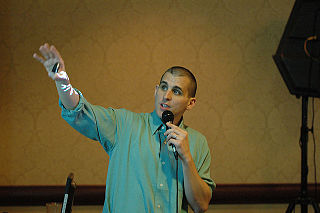A Quote by Natalie Goldberg
Let's say I've directed that [writing] energy into writing my latest book but suddenly, I really want to write about an onion. I don't say to myself, "No, you have stay on the subject," because I know that the longer I stay on the subject the more boring I get. So, if my mind wants to write about an onion, it might be a deeper way to go into what I'm working on, even though it might seem irrelevant. This is how I've learned to follow my mind.
Related Quotes
I don't write about sex because it's not really my subject. I love it when other people write about it, but it's not my subject, and I don't want anyone I've had sex with to write about it. Plus, you're in front of an audience, and they picture wherever you're writing about. I'm 52; no one in the audience wants to picture that.
One of the few ways I can almost be certain I'll understand something is by sitting down and writing about it. Because by forcing yourself to write about it and putting it down in words, you can't avoid having your say on the subject. You might be wrong, but you have to think about it very intensely to write about it.
My writing knows more than I know. What a writer must do is listen to her book. It might take you where you don’t expect to go. That’s what happens when you write stories. You listen and you say ‘a ha,’ and you write it down. A lot of it is not planned, not conscious; it happens while you’re doing it. You know more about it after you’re done.
Generally I start writing when I have even the smallest idea of how a book is going to go, because the physical process of writing itself keeps the mind active and focused on the job at hand. Usually I write in about 5 drafts, but that simply means there are 5 definite times when I go in a linear fashion from the beginning to the end of the book.
When I'm writing, I really want to satisfy myself. I've got a story that I am working on and struggling with, and I want to tell it the most effective way I can. That's really what I struggle with. And the thought of who may be reading it may be there somewhere in the back of my mind - I'll never say it's not there because I don't know - but it's not really what I'm thinking about.
And then afterwards I worked in advertising for a year which taught me about writing even when you don't want to (laughter) because there's never a moment that you want to write about an Erickson cell phone but you have to. And that's really important you know obviously for the...like if you really want to write, you have to write every day no matter how you feel or you know. And then, yeah, and then I ended up working in TV and then from TV into movies and then directing, so.
I write for myself, and perhaps for half a dozen friends. And that should be enough. And that might improve the quality of my writing. But if I were writing for thousands of people, then I would write what might please them. And as I know nothing about them, and maybe I'd have a rather low opinion of them, I don't think that would do any good to my work.
I always try to write a song, I never just want to write a record. Originally I was not writing songs for myself. ....And I can say this, most of the people who have recorded my songs are songwriters themselves. ... Even if I don't release it myself, somebody else might hear it and want to record it. When you write a song, it gives it that potential. When you write a song, a song has longevity. ... So I wanted to sing inspirational music, and that's exactly how I approached it-only the words have been changed to declare my relationship with God. Songwriting is my gift from God.
I made up my mind long ago to follow one cardinal rule in all my writing-to be clear. I have given up all thought of writing poetically or symbolically or experimentally, or in any of the other modes that might (if I were good enough) get me a Pulitzer prize. I would write merely clearly and in this way establish a warm relationship between myself and my readers, and the professional critics-Well, they can do whatever they wish.

































